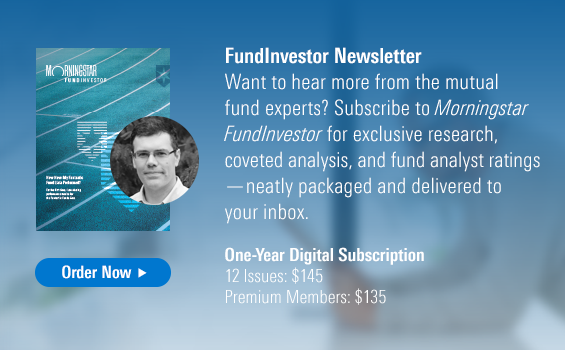Top Core International Funds for Rebalancers
Christine Benz: Hi, I'm Christine Benz for Morningstar. If investors are doing some portfolio maintenance near year-end, they may discover that their portfolios are lighter on foreign stocks than they may have expected. Joining me to share some perspective on that issue and to highlight a few broad foreign stock funds is Russ Kinnel. He is Morningstar's director of manager research.
Russ, thank you so much for being here.
Russ Kinnel: Glad to be here, Christine.
Benz: Russ, let's talk about why foreign stocks have underperformed. We've had several years running of this underperformance relative to the U.S. Why is this happening?
Kinnel: I think there's a bunch of factors going on, but one is simply the dollar has been strong for a lot of those times. Another is that the Fed has been more accommodative than the European Central Bank and many other central banks and that obviously has propelled U.S. stocks. And I think, finally, a lot of the big tech names that are just dominating returns now are in the U.S. Not all of them. Alibaba is in China, obviously. So, there's some others. But really, the ubiquitous FAANGs are in the U.S., and so that's another element, too.
Benz: I feel like we've had this conversation on multiple occasions over the past several years, but can you talk about why investors would want to think about maintaining international diversification in their equity portfolios?
Kinnel: That's right. Well, we've seen this movie before. You may recall in the late '90s a lot of people's--the U.S. dominated foreign markets--and a lot of people kind of puffed their chest and said, "Well, U.S. companies are superior. Our model of capitalism is superior. Who needs foreign companies?" And of course, we got humbled by a very severe bear market, and the rest of the world outperformed the U.S. for about 10 years. Now, we've had another 10 years of U.S. outperformance. So, that doesn't mean that the calendar change will start the decade for foreign equities. It never works that nicely. But it certainly means that there's a lot of value in diversification, just as there's value in any other form of diversification. It's not that this area will always do well. It's that there are times when it will do better than the U.S. and therefore that adds some value to our returns on a risk-adjusted basis.
Benz: If investors are doing some year-end rebalancing and they're in there looking at their foreign stock weightings and determining that they maybe need to add some more foreign stock exposure--you brought some funds that you and the team like quite a bit. Let's start with a really simple idea, which would be to just use some sort of a plain-vanilla total stock market index that invests overseas.
Kinnel: I think that's a great idea. You can buy some really low-cost overseas index funds. For a while, there was a bigger gap in fees between the U.S.-based market indexes and foreign, but now they're very cheap. If you're buying a cap-weighted index from Vanguard or iShares, they're very cheap. And so, I think that's a great option to build the core of your foreign equity portfolio.
Benz: How about American Funds International Growth and Income IGAAX? I know that's another one that you and the team like, and I have it in some model portfolios for Morningstar as well. Talk about what you and the team see there that you like so much.
Kinnel: Yeah, I think dividend focus is really an American Funds' wheelhouse. And so, I really like their dividend focus. This fund has a modest dividend mandate, and that is, it has to have a pre-expense yield slightly above the total foreign market. It's a modest goal, but what that means is by focusing on dividends but not going to an extreme, it means they're not taking on huge risks, because when you really emphasize yields and try to have a really big yield relative to the market, you're going to be buying highly debted companies, companies with no growth prospects, and so you're taking on a lot more risk. Capital Group over the years has shown it's very good at this strategy. It's very good at foreign equities. The A shares and some other shares are pretty cheap, too. There are good stewards. So, it's not a thrilling fund, but it's a nice core fund.
Benz: And T. Rowe Price Overseas Stock TROSX is another fund that you and the team like. Let's talk about that one.
Kinnel: Yeah, this is another kind of sleepy core fund that's fairly diversified, about 150 names. Ray Mills has done a really nice job over the years. You look at year-to-year performance, and you'll see generally it's not too far off from the benchmark and peer group. But they're good stock-pickers, and over time, the idea is that those stock picks will shine through. So, again, a nice core fund that won't be very exciting, but again, I think will do the job well.
Benz: Russ, it's always great to get your perspective. Thank you for taking the time to be here.
Kinnel: You're welcome.
Benz: Thanks for watching. I'm Christine Benz for Morningstar.


/s3.amazonaws.com/arc-authors/morningstar/fcc1768d-a037-447d-8b7d-b44a20e0fcf2.jpg)
/s3.amazonaws.com/arc-authors/morningstar/66112c3a-1edc-4f2a-ad8e-317f22d64dd3.jpg)
/cloudfront-us-east-1.images.arcpublishing.com/morningstar/ZKOY2ZAHLJVJJMCLXHIVFME56M.jpg)
/cloudfront-us-east-1.images.arcpublishing.com/morningstar/IGTBIPRO7NEEVJCDNBPNUYEKEY.png)
/cloudfront-us-east-1.images.arcpublishing.com/morningstar/HDPMMDGUA5CUHI254MRUHYEFWU.png)
:quality(80)/s3.amazonaws.com/arc-authors/morningstar/fcc1768d-a037-447d-8b7d-b44a20e0fcf2.jpg)
:quality(80)/s3.amazonaws.com/arc-authors/morningstar/66112c3a-1edc-4f2a-ad8e-317f22d64dd3.jpg)